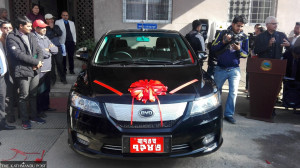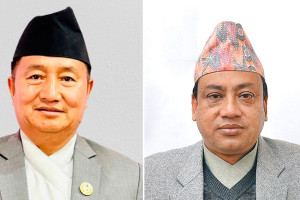Books
Books will remain integral to human existence
Director Chetan Angthupo discusses his favourite books, the importance of reading, and how it improves an artist’s understanding of the world.
Aarati Ray
Founding chairman and director of ChulaChuli Theatre, Illam, Chetan Angthupo, has been active in the theatre field for seventeen years, working as a director, writer and instructor. He has worked in more than two dozen plays like ‘Jhoda’ and ‘Buddha and Bhikari’.
In an interview with Post’s Aarati Ray, Angthupo shares his love for books and how it shapes his journey in theatre.
How is your relationship with books?
I’m an avid book enthusiast, and my love for books has been with me since I was nineteen. Every penny I earn goes towards expanding my collection. When I have even a little money, I immediately think of buying another book.
Before libraries were accessible, I satisfied my reading cravings with newspaper articles. However, when a small library opened eight kilometres away from my village at Damak, in 2004, I began visiting it regularly and borrowing books. Eventually, I decided to collect books myself. Now, I am in a never-ending rabbit hole.
What are your thoughts on the current trend of romance novels and stories dominating the Nepali literary landscape?
I’ve never been drawn to love stories because they mostly focus on the lives of individuals without offering much guidance for society or critical thinking. Nepali literature, in particular, is known for its love stories, which attract many young readers. However, indulging solely in these texts limits their perspectives rather than broadening them. Instead of solely focusing on romantic relationships, young readers should explore literature that discusses society, community, and nation-building for a more holistic understanding of the world.
Do you think your journey in theatre has been influenced by books?
Books and music have profoundly influenced my journey into theatre. ‘Chadera Kam Sara’ by Shisir Yogi, in particular, made me realise the limited reach of literature in society and inspired me to use theatre as a medium to extend its influence.
Recognising the scarcity of libraries in my village fifteen years ago, I converted my personal collection of books into a temporary theatre space. Later, developing the same, I established the Rangamancha Pustakalaya (ChulaChuli Theatre Library) in Illam in 2018. I spend most of my earnings to add books to the library, which has become a big resource for knowledge for young people in my village. During a visit to Kathmandu in 2017, I purchased books weighing around one quintal for the library.
What do you think about the influence of digitalisation on books?
In the age of digitalisation, society’s attention towards books has waned somewhat. However, I’ve always believed that no matter what advancements technology brings, books will remain an invaluable part of human existence. They are timeless and enduring.
Despite the convenience of Google and other online resources, I still hold firm to the belief that books offer a depth of knowledge and insight that cannot be fully replicated in digital form. While Google may provide vast amounts of information, it often lacks the depth and nuance found in books. For instance, when I tried to research the history of ‘Jhoda’, I couldn’t find it online and had to browse books. I realised that information on our history and culture which can not be available online can be discovered within the pages of books.
Libraries, in particular, serve as vital repositories of human history and civilisation. They safeguard documents, record human endeavours, and preserve our collective heritage.
What do you think about the government’s decision to allocate a budget of six lakhs for schools to open libraries in 2019/2020?
I’m dissatisfied with the current library funding and implementation in my village. Despite government allocations, libraries in schools often seem symbolic—school’s aren’t putting in genuine efforts to promote reading among students. I’ve discussed this with educators, questioning the purpose of libraries if students aren’t encouraged to use them.
Investing in existing community, social organisation or theatre libraries would be more beneficial than creating new school libraries.
The lack of reading habits among the younger generation is largely due to deficiencies in the educational system. Reading culture is lacking in schools. This is a big flaw of the Nepali education system. Rather than encouraging a love for literature and culture, the focus is often on rote learning and course materials. Poetry, for example, is taught as a set of rules rather than a medium to explore one’s creativity. This approach instils a fear of books in students, and they view reading as a tedious activity rather than a source of knowledge and joy.
What did you struggle with the most while adapting your recent play ‘Jhoda’ from Ganesh Rasik’s book ‘Akashgangako Otmuni’?
Adapting ‘Jhoda’ for the stage presented several challenges. Firstly, the meaning of ‘Jhoda’ in the original book wasn’t clear, so we struggled to convey its significance to the audience. Additionally, we had to balance preserving the author’s vision with adding depth to the play, which was tricky.
When adapting a book for the stage, some changes are inevitable. Despite our efforts to stay true to the source material, we had to interpret and adjust certain aspects of the play. Audience reactions to ‘Jhoda’ varied. Some liked the new elements we added, while others didn’t.
When books depict a marginalised community suffering, we have to show the community fighting back in the play (sometimes), to make it more engaging.
Overall, adapting a book for the stage involves balancing the author’s and director’s visions to create a compelling performance.
How do directors and authors collaborate while adapting a book into a play?
The first thing directors have to do while adapting a book into a play is obtain permission from the author. Subsequent collaboration depends on the author’s stance. Some authors are open to alterations to the story and characters for the sake of the play, while others are more rigid in their preferences. Working within the constraints of an author’s preferences can be challenging, especially when there's limited creative freedom.
For instance, in the case of ‘Jhoda’, the original book was based on the Rai community in Bhojpur. However, as a Limbu, I felt more comfortable adapting the storyline to the Limbu community of Tarai. This decision was made out of respect and to avoid inadvertently misrepresenting the Rai community. Thankfully, Ganesh Rasik readily granted permission.
Do you see any room for improvement within Nepali literature?
To be honest, there was a period when I took a hiatus from reading Nepali literature because I felt that many works were becoming too similar. It started around the time when Amar Neupane’s ‘Karodaun Kasturi’ was released. Nepali literature was becoming increasingly commercialised and repetitive.
However, my interest reignited when stories revolving around civil wars emerged. After reading ‘Ainthan’ by Bibek Ojha, in particular, I realised that Nepali literature still predominantly revolves around romanticism, idealism and imagination. I believe it’s time for our literature to shift its focus towards guiding society and the younger generation, rather than solely indulging in imagination and emotion.
Plays without dialogues, like Kausi Theatre’s recent ‘Ubur Ubur Tikki’, that focus on body movement are flourishing these days. What are your thoughts on them?
I want to explore this medium of theatre in the future. I find the concept of a play where words are unnecessary and the narrative unfolds through actions rather than dialogue intriguing. I admire how Sudam CK is taking the Nepali theatre to a new step. Plays like ‘Ubur Ubur Tikki’ introduce new things to the theatre scene.
—
Chetan Angthupo’s book recommendations
The Old Man and the Sea
Author: Earnest Hemingway
Publication: Charles Scribner’s Sons
Year: 1952
This book is about the power of perseverance and dignity in overcoming life’s challenges. It teaches us a lot about human strength and acknowledges the cyclical nature of existence.
Purbi Nepalma Limbu Jaatiko Kipat ra Samajik Pherbadal
Author: Lionel Caplan (Nepali)
Publication: Janajati Tatha Baikalpik Bikas Adhyaan Kendra
Year: 2010
This book offers valuable insights into the challenges and origins of the Limbu and Kipat communities. I like Caplan’s thorough research and accurate portrayal of the two communities.
Badalindo Nepali Samaj
Author: Chaitanya Mishra
Publication: FinePrint
Year: 2014
‘Badalindo Nepali Samaj’ offers a detailed examination and thorough analysis of Nepal’s evolving society through a Marxist lens, focusing on various aspects like state power, social norms, family dynamics and individual experiences.
Ekkaisau Shatabdi Ma Nigrani Ra Swatantrata
Translator: Rohej Khatiwada
Publication: Indigo Ink
Year: 2024
The book is a compilation of articles covering global politics, economics and technological advancements. For those who want to analyse and reflect on the major characteristics of the first quarter of the 21st century, it is a must-read.
Sanskriti Chintan
Author: Arun Gupto
Publication: Indigo Ink
Year: 2023
The essays in ‘Sanskriti Chintan’ prompt readers to reconsider their views of art, culture, diversity and critical thinking. Gupto shares fresh perspectives that the readers may not have considered before.




 26.21°C Kathmandu
26.21°C Kathmandu

















